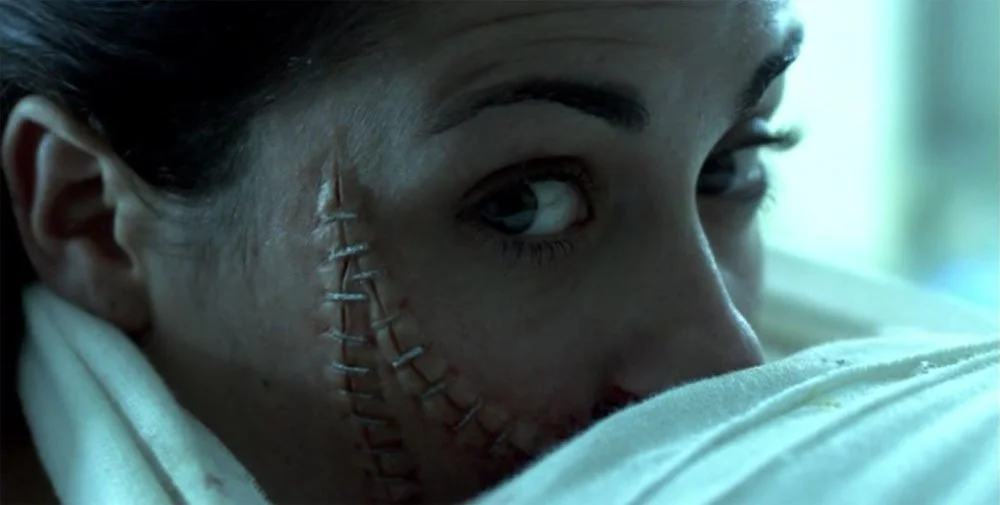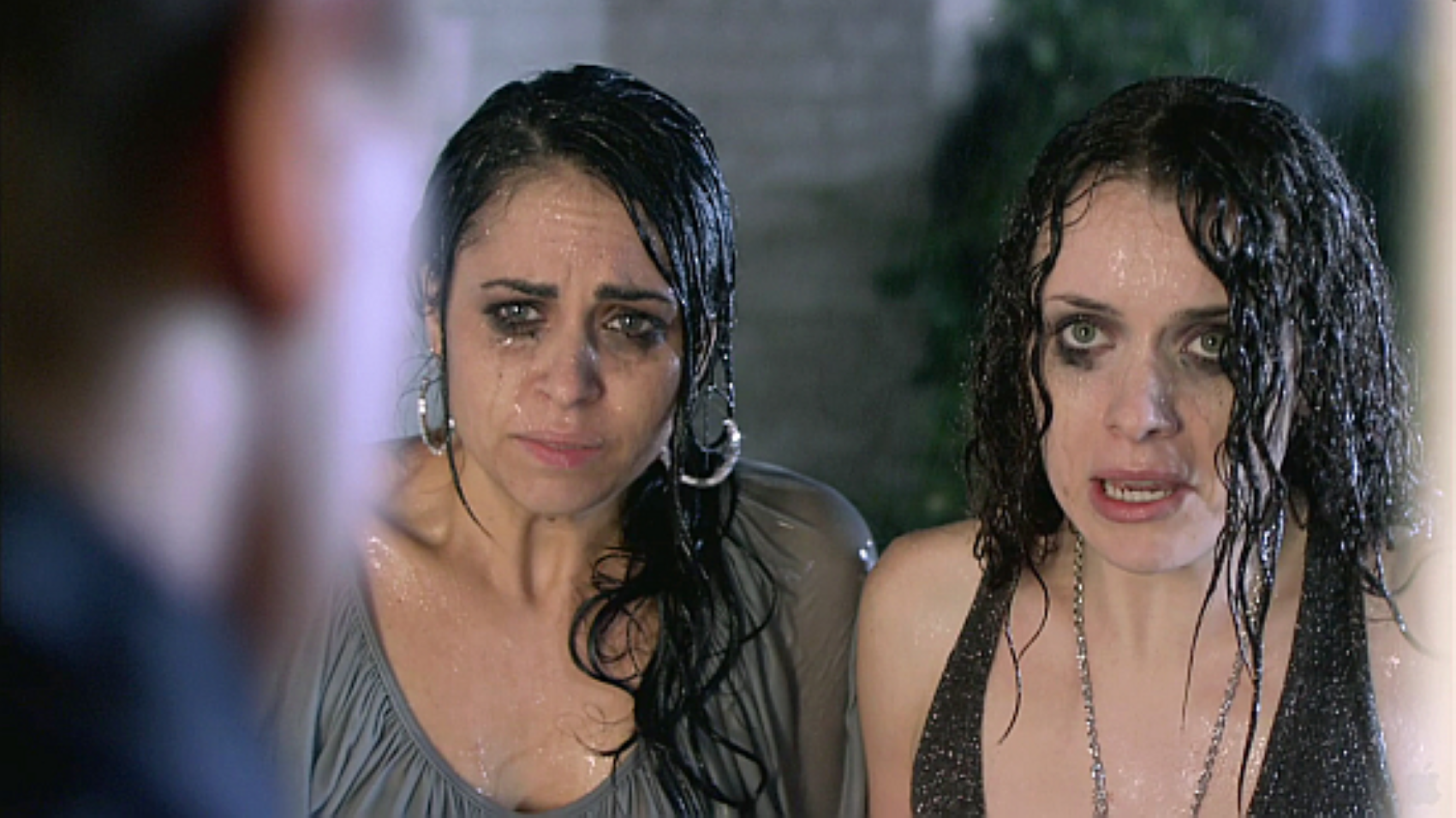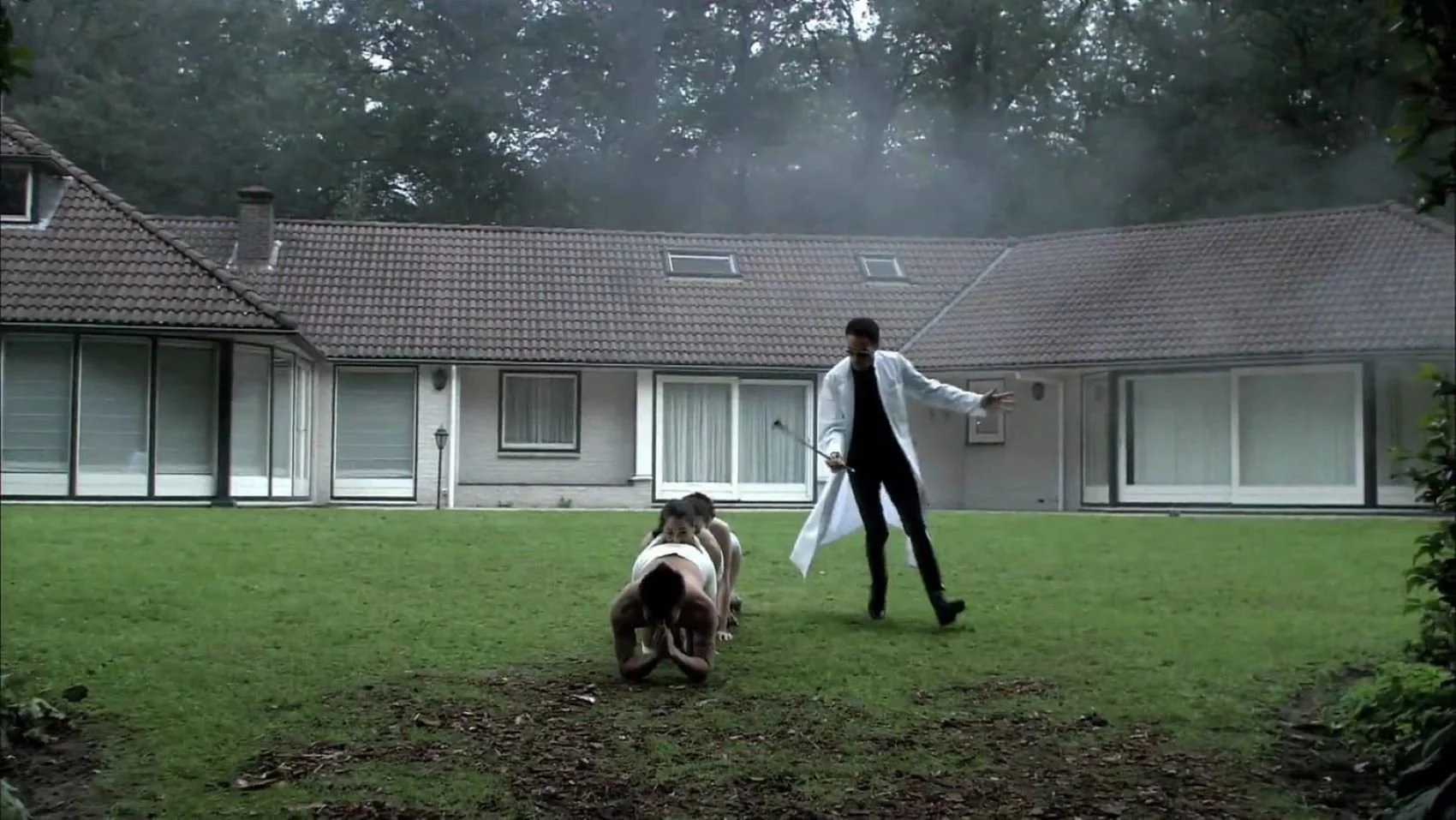[Editorial] Eat Shit and Die: Watching The Human Centipede (2009) in Post-Roe America
Trigger warning: abortion access, mention of miscarriage.
On Saturday, 17th June 2023, I sat down with two friends to watch The Human Centipede (First Sequence) (2009) and The Human Centipede 2 (Full Sequence) (2012). I was nervous to be grossed out (I can’t really handle the idea of eating shit) but excited to cross these two films off my list. I was preparing for a Ghouls podcast episode with Assistant Editor Rebecca McCallum, and I knew that no matter what I thought of the films, we would have a fun discussion, and it would be worth it.
As often happens when I watch a movie with a reputation (see my musings on Nekromantik 2), I ended up really enjoying The Human Centipede (First Sequence). It’s a well-made film that carefully decides what it will show you, and what it will keep off-screen. The performances are stunning and the tension was everything I expected. What I did not expect was to be thinking so much about the film’s analogies to abortion access.
You see, almost one year earlier to the day, abortion access was restricted in the United States, in a way we hadn’t experienced in over fifty years. In my entire lifetime, abortion has been a controversial issue, but it was protected at a federal level. And on 24th June, 2022, that access was suddenly gone. That’s not to say it happened without warning. The political landscape in the US in the preceding years had been warning us this was coming, and we knew that a very conservative Supreme Court was making a decision about abortion access that week.
For anyone who doesn’t know the history: In 1973, the US Supreme Court determined that access to abortion was implied as a constitutional right under the 14th amendment, as part of a right to privacy. This decision was made as part of a case called Roe vs. Wade. In 2022, a divided Court overturned that decision, and decided that a right to abortion access was not implied. When the Court announced their decision, many states had “trigger laws” that went into effect right away. These were older laws on the books that meant as soon as federal access to abortion was abolished, state laws took over, and some states where abortion had been legal abruptly had different laws. Suddenly, doctors and medical staff weren't sure what they were legally allowed to do. The laws changed instantly, and no one had time to prepare staff for what that meant. Some trigger laws implied it was even illegal to treat emergencies like certain kinds of miscarriages, and patients died waiting for treatment. All that to say, it’s been a tough year to consider bodily autonomy in the US.
You likely know the plot of the human centipede, even if you haven’t seen it. A German doctor, Dr. Heiter (Dieter Laser) kidnaps tourists and sews them together, mouth to anus, making one continuous digestive tract. It’s one of those movies in which the plot is simple, but sitting through it is where the tension comes from. It’s a fascinating film - the Dr. Heiter is clearly off his rocker the entire time, and no one he meets trusts him. There is no question if we should sympathize with him - we should not. The police are suspicious of him because there is plenty of evidence pointing in his direction; it’s not even like Heiter is a criminal mastermind. Still, in just a short amount of time, he ruins the lives of several people.
There are many reasons this film made me think about abortion access in the US. It’s a heightened analogy, so the lines I am going to draw are extreme. The first reason is because it’s a film about one single person making decisions that impact others for selfish reasons. The US Supreme Court is composed of nine judges, and of course they are influenced by the entire country, so it’s not exactly like one person is making decisions that affect everyone else. But when Roe Vs. Wade was overturned, it felt like a huge impact by a small group, and that must be how Dr. Heiter’s victims feel.
The centipede he makes is three people long. Two women, who are friends traveling from America, Jenny (Ashlynn Yennie) and Lindsay (Winter Williams), and one Japanese man, Katsuro (Akihiro Kitamura). Jenny and Lindsay end up at Heiter’s house because of car trouble, and they go to the nearest house for help. They go to a doctor for help, and they die, which is what’s happening to some women in America when medical staff aren’t sure what they are allowed to do. The doctor speaks English to his victims, but Katsuro doesn’t understand English. Heiter arranges the centipede with the man in front, and the two women behind him. He might have done this in part so that he didn’t have to listen to pleas in a language he understands, since the women speak English. Katsuro talks and yells, but he and Heiter don’t understand each other. Heiter silenced the women and now he doesn’t have to listen to any objections. Of course, Katsuro is impacted negatively by the doctor's decisions - he doesn’t want to be a part of the centipede, even if is at the front. That reminds me of the way restricting abortion access also negatively impacts men, just in a different way than it impacts women. Still, Heiter gave the most powerful position in the centipede to a man, so Katsuro is in a slightly better position than the women, which is also the case when it comes to needing an abortion. With the man in front, he gets a voice, where the women have literally been silenced, with their mouths stitched to anuses. This reminded me of the way women felt silenced when Roe was overturned, like our voice on the matter didn’t matter any more. We need men to speak up, too, women cannot be the only ones advocating for safe abortion access for all. If men have a voice, they need to use it.
The Human Centipede (First Sequence), women are completely at the mercy of men. First when the doctor drugs them and forces surgery on them. Then when they are dependent on the Katsuro. Being at the mercy of a doctor who will or won’t decide to perform a surgery has a clear line to abortion access. When the trigger laws went into effect, many doctors and other medical professionals weren't sure what was legal, and what would get them thrown in jail. They had patients waiting to see what they would decide to do. In the film, when the surgery is performed, and Lindsay and Jenny are a part of the centipede, they are reliant on the man in front for their survival. They can take part in his plans, when he signals at them to move toward an escape, but they can’t decide or act on their own. This reminds me of the helplessness I feel regarding abortion access. I can vote, donate, raise awareness, and fight as hard as I can, but I can only do so much from my position. Ultimately, I am at the mercy of politicians, who are making decisions for their own “survival” as well.
Another analogy that’s hard to ignore is the disregard for women’s bodies. Katsuro gets food, the women literally get his shit, and are expected to survive without the same benefits as men. This reminds me of the way women’s bodies are viewed by some. Some see us as incubators, vessels for carrying fetuses, and nothing more. To some, a fetus is immediately more important than the pregnant person carrying it. If our non-pregnant bodies are worthless, feeding us shit doesn’t matter.
Finally, one important way The Human Centipede (First Sequence) brings to mind the issue of abortion access in the US is the consequences to the decision maker. The person making decisions about others’ bodies doesn’t have to experience what they experience. He gets to stay removed from it, and talk about philosophically. Dr. Heiter has lofty ideas that only make sense to him, and he’s happy to talk on and on about them. But he doesn’t ever suggest putting himself in his “genius” creation of a centipede. This is like the way politicians who make decisions about abortion access will never be impacted the same way as the average American citizen. Restricting abortion access means restricting safe abortion access from the masses. People with money and power will always find a way to get a safe abortion when they need one. They never feel the impact of their decisions. Meanwhile, many Americans would have to travel hundreds of miles to find a safe abortion, if they can even get an appointment in time, because now the places that provide abortions have such higher demand. We are trapped in this creation of politicians who will never know how it feels, and we are fighting not only for rights, but for literal survival.
I watched The Human Centipede (First Sequence) almost exactly one year after abortion access ripped away in America. I enjoyed watching a nasty film, and crossing a big one off my list, but most of all, I appreciated the reminder that the battle’s not over until it’s over, and we need to keep fighting.




























![[Editorial] “I control my life, not you!”: Living with Generalised Anxiety Disorder and the catharsis of the Final Destination franchise](https://images.squarespace-cdn.com/content/v1/5fe76a518d20536a3fbd7246/1696444478023-O3UXJCSZ4STJOH61TKNG/Screenshot+2023-10-04+at+19.30.37.png)
![[Editorial] 5 Slasher Short Horror Films](https://images.squarespace-cdn.com/content/v1/5fe76a518d20536a3fbd7246/1696358009946-N8MEV989O1PAHUYYMAWK/Screenshot+2023-10-03+at+19.33.19.png)
![[Ghouls Podcast] Maniac (2012) with Zoë Rose Smith and Iona Smith](https://images.squarespace-cdn.com/content/v1/5fe76a518d20536a3fbd7246/1696356006789-NYTG9N3IXCW9ZTIJPLX2/maniac.jpg)
![[Editorial] If Looks Could Kill: Tom Savini’s Practical Effects in Maniac (1980)](https://images.squarespace-cdn.com/content/v1/5fe76a518d20536a3fbd7246/1694952175495-WTKWRE3TYDARDJCJBO9V/Screenshot+2023-09-17+at+12.57.55.png)
![[Editorial] Deeper Cuts: 13 Non-Typical Slashers](https://images.squarespace-cdn.com/content/v1/5fe76a518d20536a3fbd7246/1694951568990-C37K3Z3TZ5SZFIF7GCGY/Curtains-1983-Lesleh-Donaldson.jpg)
![[Editorial] Editor’s Note: Making a slash back into September](https://images.squarespace-cdn.com/content/v1/5fe76a518d20536a3fbd7246/1694354202849-UZE538XIF4KW0KHCNTWS/MV5BMTk0NTk2Mzg1Ml5BMl5BanBnXkFtZTcwMDU2NTA4Nw%40%40._V1_.jpg)